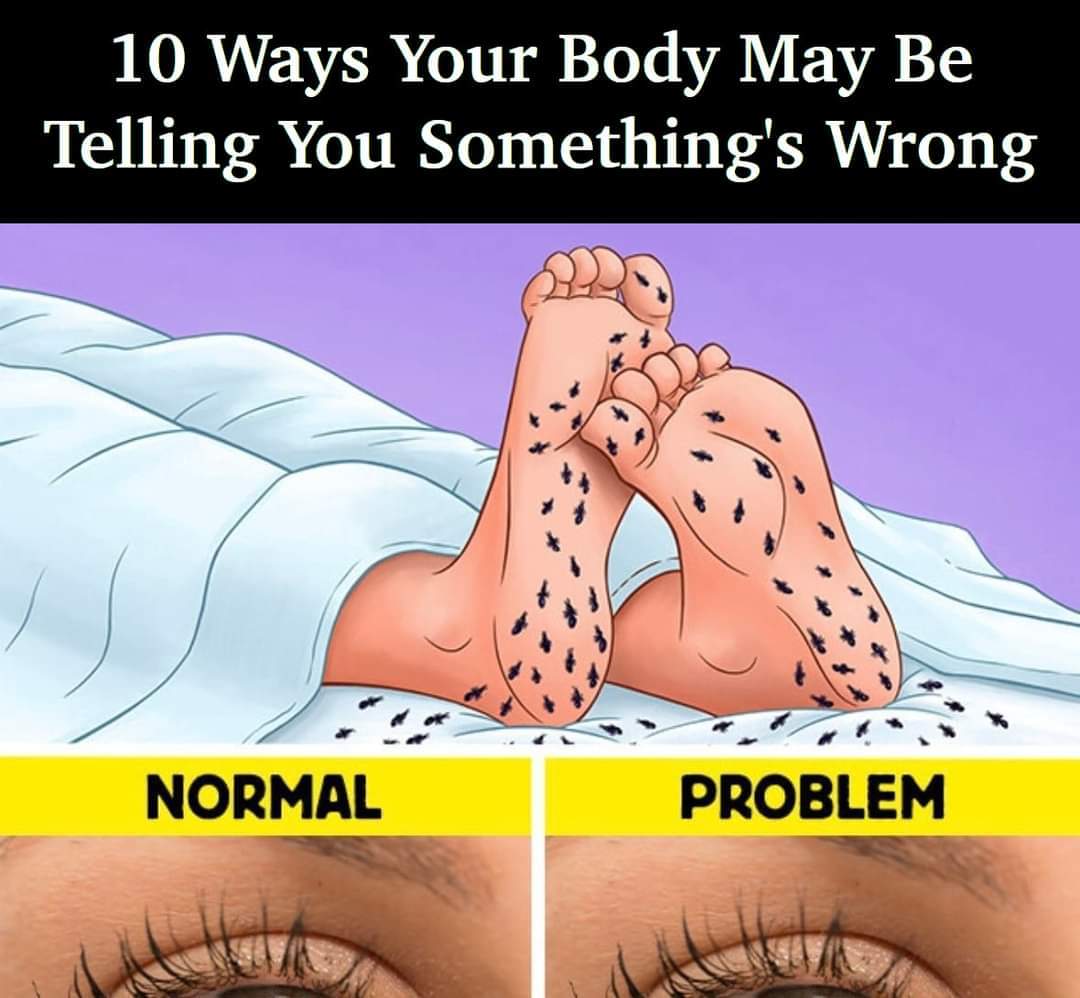Your body is an incredibly intelligent system, constantly sending you signals to let you know when something isn’t quite right. While some signs of illness or poor health are obvious—like a fever, a sore throat, or a persistent cough—others are much more subtle and easy to overlook. However, paying attention to these small cues can make a significant difference in catching potential health problems early, preventing them from escalating into something more serious. From an unusual craving to changes in your skin or sleep patterns, these signals shouldn’t be ignored. Here are ten subtle ways your body might be trying to tell you something’s wrong and what you can do about them.

One subtle but telling sign is an uncomfortable crawling or achy sensation in your legs, particularly when you’re sitting or lying down. This could indicate Restless Leg Syndrome (RLS), also known as Willis-Ekbom Disease. This neurological condition creates an uncontrollable urge to move your legs, and while it may seem harmless, it can significantly disrupt your sleep and overall quality of life. Common triggers include low iron levels, certain medications, or even underlying conditions like diabetes or kidney disease. While medication and lifestyle adjustments, such as reducing caffeine intake, maintaining a regular sleep schedule, and moderate exercise, can help, it’s essential to consult a doctor for proper evaluation and treatment.
Another sign is thickening skin. Your skin is your body’s largest organ and can often indicate internal issues. Skin that becomes abnormally thick, itchy, or scaly could point to conditions such as Psoriasis, Hypothyroidism, or Pityriasis Rubra Pilaris (PRP). These conditions are often associated with immune system dysfunction or hormone imbalances. If you notice persistent skin changes, consult a healthcare professional. Blood tests and skin evaluations can help determine the root cause, and appropriate treatments, such as topical medications, hormone therapy, or dietary changes, can be prescribed.
Changes in your handwriting, sense of smell, or even your dreams might also signal early stages of Parkinson’s Disease. While the disease is primarily associated with tremors and stiffness, these subtle symptoms often manifest first. Some people notice smaller handwriting, difficulty speaking clearly, or recurring vivid dreams. Although there’s no cure for Parkinson’s, early detection can significantly improve symptom management through medication, physical therapy, and lifestyle changes.
Unexpected emotional changes, like sudden outbursts of anger or heightened aggression, can also indicate an underlying issue. While anger is a natural emotion, excessive or uncontrollable rage over minor irritations may be a symptom of Depression or Anxiety Disorders. Many people don’t associate anger with mental health conditions, but psychologists recognize it as a key indicator. Seeking therapy, counseling, or medication can often help address the root cause of these emotional responses.
Sleeping too much or feeling excessively tired despite adequate rest might be a sign of Hypersomnia. This condition goes beyond feeling occasionally sleepy—it’s characterized by an overwhelming need to nap during the day, even after long hours of nighttime sleep. Hypersomnia can be linked to conditions like Multiple Sclerosis, Depression, or Epilepsy. Treatment options might include medication, lifestyle changes, and adjustments to your daily routine, such as avoiding caffeine and alcohol.
If you notice a gray ring forming around your cornea, known as Arcus Senilis, it could be a sign of high cholesterol. While it’s common in older adults and often harmless, in younger individuals, it may indicate elevated cholesterol levels, which could increase the risk of cardiovascular diseases. A blood test can confirm cholesterol levels, and if necessary, lifestyle changes and medications can help manage them.
Strong salt cravings might seem harmless but could signal an underlying health issue. While occasional cravings are normal, persistent, uncontrollable salt cravings could indicate Addison’s Disease, Bartter Syndrome, or Cystic Fibrosis. These conditions often present with other symptoms, such as dehydration, low blood pressure, or electrolyte imbalances. If salt cravings are persistent and accompanied by other unusual symptoms, a medical consultation is essential.
If you find yourself frequently forgetful, lacking energy, and experiencing a reduced desire for intimacy, it could indicate Hypothyroidism. This condition occurs when your thyroid gland doesn’t produce enough thyroid hormones, affecting your metabolism, energy levels, and overall health. Symptoms may also include dry skin, weight gain, and sensitivity to cold temperatures. A simple blood test can diagnose thyroid problems, and treatment typically involves hormone replacement therapy.
Excessive thirst, medically known as Polydipsia, is another sign you shouldn’t ignore. While it could simply be a result of dehydration, persistent and unquenchable thirst can signal Diabetes Mellitus or Diabetes Insipidus. These conditions interfere with your body’s ability to regulate blood sugar or fluid levels. If excessive thirst is accompanied by frequent urination, unexplained weight loss, or fatigue, it’s crucial to consult a doctor for proper testing and treatment.
Lastly, an unusual craving for chewing ice, known as Pagophagia, is often linked to an Iron Deficiency or Anemia. While it might seem like an innocent habit, it’s your body’s way of signaling a potential nutritional deficiency. A blood test can confirm if anemia is the cause, and supplements or dietary adjustments can usually resolve the issue.
Your body is constantly communicating with you, often in ways that are easy to dismiss or overlook. These subtle signs—whether they’re physical, emotional, or behavioral—are your body’s way of saying something isn’t quite right. Ignoring these cues can allow minor issues to develop into major health problems. If you notice persistent or unusual changes, it’s essential to listen to your body and consult a healthcare professional. Early intervention often leads to better outcomes, and being proactive about your health is one of the best ways to ensure long-term well-being. In the end, you know your body better than anyone else, so trust those instincts when something feels off and take the necessary steps to address it.





